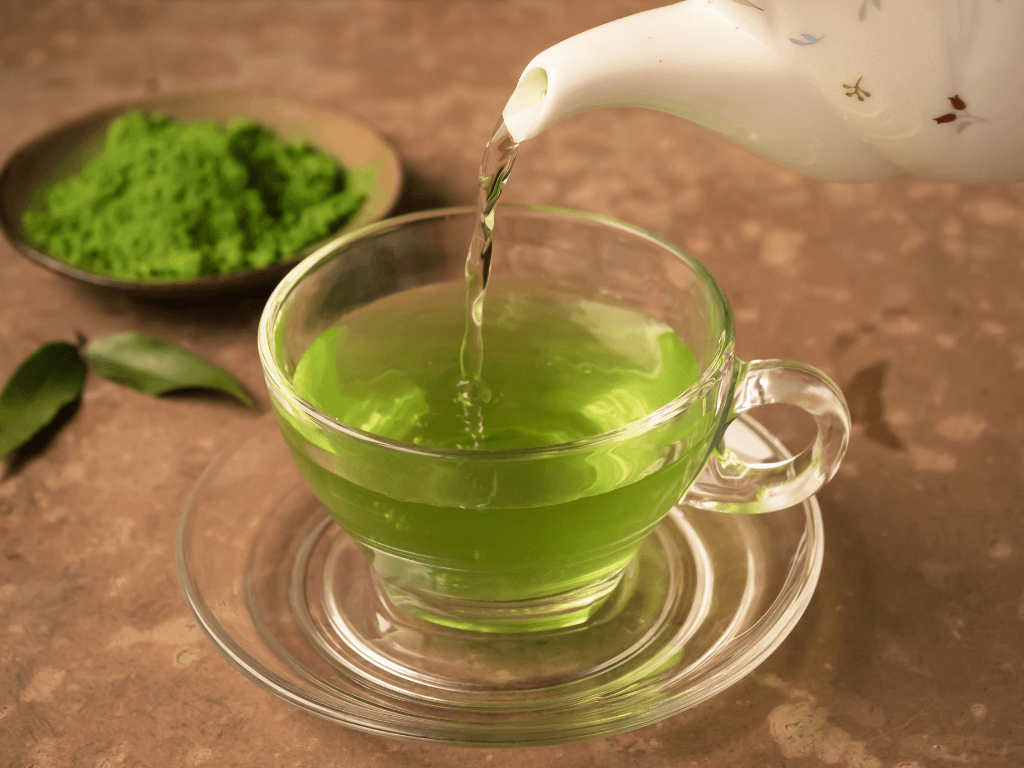Health Benefits of Green Tea: Why It’s Good for You

What is Green Tea?
For centuries, the Camellia sinensis plant has been used to create green tea, a refreshing beverage packed with antioxidants, especially catechins that fight free radicals and protect the body from chronic illnesses. It contains caffeine for a gentle energy boost and L-theanine, an amino acid that promotes relaxation and mental clarity.
- Nutritional Content: Green tea is low in calories and free from fat or cholesterol. It includes vitamins C, E, K, various B vitamins, and trace minerals such as potassium, calcium, and magnesium. Research shows green tea can aid in weight loss, enhance brain function, and offer anti-inflammatory and anti-cancer properties. However, nutrient content may vary by brand and brewing method.
- Brewing Tips:
- Choose high-quality loose-leaf tea or tea bags.
- Heat water to 160–180°F (70–82°C).
- Steep for 2–3 minutes for mild flavor or up to 5 minutes for a stronger brew.
- Enjoy hot or cold with optional lemon or honey.
Nutritional Content of Green Tea
Green tea delivers essential nutrients that contribute to a healthy lifestyle:
- Catechins: Powerful antioxidants that reduce oxidative stress.
- Vitamins and Minerals: Includes vitamin C, vitamin B2, and manganese.
- Caffeine and L-theanine: Offers alertness without the crash, promoting a calm, focused mind.
This combination makes green tea a smart addition to a balanced diet.
Health Benefits of Green Tea
- Rich in Antioxidants: Helps neutralize free radicals, reducing the risk of chronic diseases like heart disease and cancer.
- Improves Brain Function: The synergy between caffeine and L-theanine supports focus, memory, and mood.
- Supports Weight Management: Catechins increase fat oxidation and metabolism.
- Enhances Heart Health: Regular intake improves cholesterol levels, lowers blood pressure, and boosts blood vessel function.
Incorporating green tea into your daily routine can help promote overall well-being.
Risks and Side Effects of Green Tea
While generally safe, green tea can pose some risks:
- Caffeine Sensitivity: May cause insomnia, nervousness, or increased heart rate.
- Drug Interactions: Could interact with anticoagulants, antidepressants, or blood thinners—consult a healthcare provider.
- Digestive Issues: Tannins may lead to stomach discomfort or constipation.
- Special Populations: Pregnant or breastfeeding women and those with heart, liver, or kidney conditions should exercise caution.
Moderation and medical guidance are key to safe consumption.
How to Prepare and Enjoy Green Tea
To get the most from green tea:
- Choose quality: Loose-leaf tea provides better flavor and aroma.
- Use the right water temperature: Avoid boiling water to prevent bitterness.
- Steep correctly: Steep for 2–5 minutes, depending on desired strength.
- Customize: Add lemon, honey, or mint for variety.
Other creative uses include:
- Cooking and baking: Add green tea to smoothies, desserts, or dressings.
- Mindful consumption: Explore traditional Japanese tea ceremonies for a meditative experience.
Conclusion
Green tea offers a wealth of health benefits, from boosting metabolism and brain function to protecting against chronic diseases. With its rich nutritional profile, moderate caffeine, and calming L-theanine, it’s a wise addition to your wellness routine. Just remember to consume it in moderation and consult your doctor if you have existing medical conditions.
Start sipping today and enjoy the journey toward a healthier lifestyle with green tea.
Leave a Reply




Related Posts